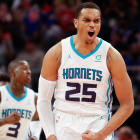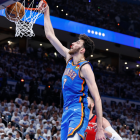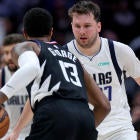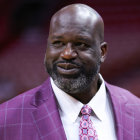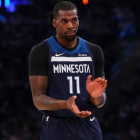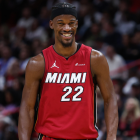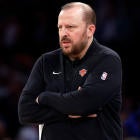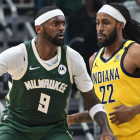A few games into P.J. Washington's NBA career, Kentucky Wildcats assistant coach Kenny Payne called to ask how in the world he was doing it. "I need you to bump your head first," Payne told him. "I don't need you to come into this league and figure it out from Day 1. What are you seeing, what are you digesting out there?"
In his first five minutes as a professional, Washington had calmly cashed three spot-up 3s. By halftime, the Charlotte Hornets forward had made five, the same number he hit in his entire freshman season in Lexington. Washington finished with seven 3s, a league record for a debut, and 27 points, more than he'd managed in any game that freshman year.
"He says the spacing is so different that if you are strong with the ball and you can drive it, you can have an impact," Payne said. In college, Washington had to deal with double-teams. He had to deal with help defenders collapsing every time he drove to the basket. "Sometimes, that's hard to read. Where now It's just so wide open and it's just a different feel and it's a flow to the game that I enjoy. And those are his words."
After practice in Manhattan in November, the No. 12 pick in the 2019 draft told me he wasn't nervous on opening night. When Washington saw the first couple of 3s go in, he told himself to keep shooting, to be aggressive but avoid bad shots. "I felt like every shot I took was kind of open," he said, and his shot just happened to be falling.
I told Washington he was understating it. Washington laughed, but didn't launch into an impassioned monologue about how incredible it felt to have his teammates mob him, see his phone blow up and learn his name had entered the record books. He allowed only that it "felt good" and it was "definitely like a dream for me" to play so well in his first game, especially since Charlotte got a win.
Through 23 games, Washington has averaged 11.7 points and 5.0 rebounds as a full-time starter. He has shot 50 percent from the field and 42.9 percent from 3-point range. And to hear him tell it, it's easy as pie — all he's doing is paying attention to how opposing teams are defending the pick-and-roll, how they're helping on the back side and then taking what the defense gives him.
"For me, it's not really tough 'cause, I mean, at the end of the day it's just basketball," the 21-year-old Washington said. "I've been playing for a long time, so I just try to use what I've known and what I've been sticking to my whole life."
James Borrego came away from his first conversation with Washington thinking he was "a very engaging, present person," the Hornets coach said. Washington didn't play at summer league because of a foot injury, but Borrego spent time with him in Las Vegas "going through plays, talking basketball, talking about life." Borrego didn't know what to expect on the court, though, and Washington still wasn't completely healthy when Charlotte started informal pickup games in September.
Early on, assistant coach Nate Mitchell told Washington that if he had to spend some time in the G League, he shouldn't worry about it, citing Pascal Siakam and Fred VanVleet's stints with Raptors 905 when Mitchell was on the staff. The conversation soon seemed ridiculous.
"That first week or two, we started to see this guy impacting the game immediately," Borrego said. "Just making the right decisions, picking stuff up. And guys liked to play with him immediately, 'cause I thought he made the right play more times than not."
Washington looked calm and composed in training-camp scrimmages, and that didn't change in the preseason or the regular season. Center Bismack Biyombo said the Hornets could see he understood basketball "in a different way than a lot of rookies."
"I was like, jeez, man, it's like this dude has been doing this for a long time," forward Marvin Williams said. "It's kind of scary, honestly. I mean you can quote me right now: There's no way that he's not going to be in the final running for Rookie of the Year."
Williams' locker is next to Washington's. In film sessions, the 15-year veteran gives the rookie pointers. "You only have to tell him something one time, he's going to pick it up right now," Williams said, snapping his fingers. "And that's even if you have to tell him. And I think if you ask any of the other vets, when you're out there on the court with him, sometimes you don't remember that this is his first year."
It is as if Washington were taking a series of tests with cheat sheets. "He's never rattled," Williams said. He also described Washington as "poised," as did Borrego and Mitchell. Washington is used to that.
"I hear it a lot in the media," Washington said. "Coaches say it a lot. But I just try to make the right play. I think that's the easiest thing for me."
Washington learned the game from his parents, who both played for Middle Tennessee State. His mother, Sherry, "averaged 20 and 10, so she was a lot better than my dad," Washington said, and she had a different coaching style: "She would just let us go out there and play. My dad was just screaming the whole time." Paul Washington Sr. coached him at Stafford Middle School in Frisco, Texas; with the Texas Celtics AAU team; and at basketball factory Findley Prep in Henderson, Nevada. Washington said Findlay Prep, which shut down unexpectedly in May, was a "great environment," and he was comfortable with his father being hard on him.
To Williams and Biyombo, it is obvious that Washington is a coach's son. To Hornets guard Malik Monk, who played against Washington when they were young, nothing he is doing should be surprising.
"I knew what he can do since eighth grade, seventh grade," Monk said. When he added that Washington's strong start "stands out to everybody else," the implication was clear: Everybody else should have been paying closer attention.
"He's just been a super solid player his whole life," Monk said. "He's been doing everything his whole life. Blocking shots, guarding multiple positions. Playing multiple positions, too."
When Payne first saw him as a high-school junior, the Kentucky assistant thought Washington moved like a shooting guard, blocked shots like a center and had a rare feel for the game. Washington was a tall kid, but he loved watching highlights of athletic guards like Russell Westbrook, Derrick Rose and DeMar DeRozan. He was also extremely familiar with the work of ahead-of-his-time 6-7 point guard Penny Hardaway, through YouTube, video games and three years spent on Team Penny, the four-time All-Star's AAU team.
Washington's poise is a reflection of his basketball IQ, but it cannot be separated from his skills with the ball in his hands. As Williams put it, if you have a tight handle and know how to get to your spots, then "you never have to be in a hurry."
Williams, like Washington, is a 6-foot-8 forward. The 33-year-old came into the league as a wing, but evolved into a stretch 4 nine years into his career. Under Borrego, Williams even plays some smallball 5. When he looks at Washington, he sees the picture of the modern NBA. "He's not your prototypical 4 man," Williams said. But he is a different kind of prototype, the kind that every team is looking for.
"Today's basketball player is a guy that can pass it, that can dribble it, that can shoot it, that can defend multiple positions," Payne said. "And if you're one of those guys and you have fight and toughness, you're probably going to reach your goals. And you're probably going to be a winning basketball player."
The first thing Payne told me about Washington was that he came into the league at the perfect time. Borrego described him as "dynamic," citing his ability to do everything the Hornets want from a pick-and-roll big man: pop, roll and make plays. Unlike many players his size, he can both stretch the floor with his shooting and punish switches in the post.
Washington believes that the more ways you can help your team, the more valuable you will be. "I try to do everything I can on the court," he said. And despite his affection for Penny highlight videos, you will not find him grumbling about the amount of quick 3s NBA teams are jacking up.
"I love it," Washington said. "It's a fast game. I feel like I'm a great fit for it. Pretty much everybody is positionless nowadays. You got power forwards like me bringing it up, guys like Draymond, guys like Giannis. Anybody can bring the ball up and initiate the offense."
Three years ago, in a blog about his decision to go to Kentucky, Washington said he saw himself as "a cross between Draymond Green with my versatility and LeBron James in the way he passes and keeps his teammates involved and gets them the ball." That he named players of their stature is less significant than that he named players of their intelligence, players who have changed the game. At Kentucky, Payne occasionally asked Washington for his thoughts on the Golden State Warriors game the night before or his impressions of a prospect.
"And what you end up finding out is that he is noticing everything," Payne said "You could put value into his assessment and evaluations of other players."
Rookies generally struggle with the speed of the NBA game. You must be able to read the game on the fly and have enough confidence in your skill set to play instinctively. It is for precisely this reason, however, that Washington has separated himself.
"I like to think it came from his mom more than his dad," Payne said. "I tease his dad about that."
After his freshman season, Washington was projected to be a second-round pick, having averaged 10.8 points and 5.7 rebounds. There were games when "you watch him and you say, 'OK, he's good,' and then you watch him another time and you say, 'Oh my God, he's special,'" Payne said. In scouting parlance, Washington's motor was inconsistent. He declared for the draft to test the waters, but decided to return to Kentucky because all signs pointed to him being a second-round pick.
"You are a lottery pick," Payne told him. "Go take what you want. Go get it."
Washington had made 23.8 percent of his 3s on just 21 attempts as a freshman. "When I was shooting the ball, every time I would catch it, I would dip it," Washington said. Coach John Calipari's plan was for him to make 500 3s a night. Payne decided that if he caught the ball at his chest and brought it down to his waist, it wouldn't count. It wouldn't count either, if he neglected to hold his follow through, or if he landed on one foot. The shots had to be perfect.
"There were nights where it was two hours and 45 minutes," Payne said. "That's a long way to get to 500."
Washington shot better when it was competitive. Payne would say, "We're going to be in here all night; managers, go get the pillows, go get some water beds, go get some air mattresses," and Washington would talk trash and find his rhythm. Eventually, Washington said his jumper "was a lot smoother and a had a lot more rhythm in it," and he had "all the confidence in the world" during games. As a sophomore, he shot 42.3 percent from deep.
Payne, though, insisted that Washington's transformation as a shooter "does not tell the story." The story, he said, is that Washington became dominant by getting in the best shape he'd ever been in. Under Payne's supervision, Washington did brutal half-hour workouts, alternating between 45-second sprints on a treadmill and a minute's worth of defensive slides. One day, covered in sweat, with bloodshot eyes, he said he wanted to stop. He did not, but "he went to his mom later and said, 'I don't want to work out with Coach Payne ever again,'" Payne said.
He did those workouts for about two weeks, dropping from 238 pounds to 226, and that was not the end of his intense sessions with Payne. Kentucky's regular conditioning session at practice is a simple sprint from baseline to baseline for either a minute and 30 seconds or a minute and 45 seconds. As a sophomore, Payne screamed at the team, "I need somebody to beat P.J.!" Nobody ever did. And when the Wildcats worked on their pressure defense, they had Washington pick up point guards full-court, furiously moving his feet and trying to cause turnovers.
Payne saw focus, swagger and toughness that Washington didn't always have as a freshman. Late in games, he had the energy to grab rebounds in traffic. When executives asked Payne why they should draft Washington, Payne said they shouldn't take him because he looks the part and has pretty jump shot -- they should do it because, in critical moments, he would fight to help his team win.
I asked Washington where he'd be if he had turned pro a year earlier. "Man, I have no idea," he said. "I'm just glad I stayed." He said he knew what he needed to do and pushed himself from the day he made his decision.
With the Hornets, Washington appears to be in an ideal situation. He is a core part of a rebuilding team, and he found chemistry with emerging point guard Devonte' Graham in no time. Unlike most of the guys drafted ahead of him, he is contributing right away. Mitchell, the assistant coach who works most closely with him, has already seen him learn from mistakes he made guarding Al Horford in the post when matched up with Blake Griffin and Julius Randle days later. Washington has quickly implemented instructions about passing in close quarters and sealing smaller defenders in the paint, too.
It takes years, however, to accurately judge a draft pick. In draft speak, Washington has shown that he has a high floor, but it is far too early to know how close he is to his ceiling. You can describe future Hall of Famers like Kawhi Leonard and Paul George as multidimensional forwards, but the same is true of a range of players, from Marcus Morris and Harrison Barnes to James Johnson and Jeff Green. In just two seasons at Kentucky, Washington vaulted himself from one tier to another. Now he and the Hornets will see how much higher he can go.
"I know that there's a lot more inside of him," Payne said.













